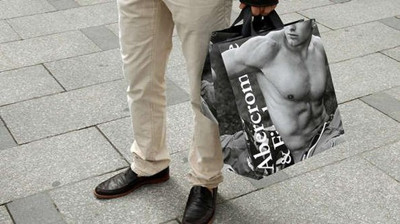種族歧視
Dress codes
著裝要求
Can a Muslim woman be denied a job because of her headscarf?
穆斯林婦女就該因為頭巾而遭遇求職被拒嗎?
SAMANTHA ELAUF, a young Muslim woman, did well in her interview for a job at a children's branch of Abercrombie & Fitch, a casual-clothing store, in Tulsa, Oklahoma. But when the interviewer told a manager about Ms Elauf's black headscarf, she was instructed to lower the applicant's “appearance” score and deny her the job. According to the company's “look policy”, employees must align their dress with the “preppy look of the Ivy League” and must not wear “caps” or black clothing. In fact Abercrombie is best-known for the half-naked (but preppy) hunks that adorn its shopping bags.
薩曼莎·埃勞夫是一名穆斯林少女,曾在Abercrombie & Fitch休閑服裝公司(位于奧克拉何馬州吐桑市)的童裝分公司面試中表現不錯。然而,當面試者和經理談起埃勞夫小姐的黑色頭巾時,埃勞夫小姐的“形象分”便大打折扣,而且她的求職也被拒絕了。根據該公司的“外貌政策(look policy)”,雇員著裝要求必須符合“常青藤學院派風格”,不能戴“帽子”,不能穿黑色衣服。事實上,A&F公司卻是因印刷在購物袋上半裸(但具學院風)的大塊頭而聞名于世。

Ms Elauf turned to the Equal Employment Opportunity Commission (EEOC), which sued the store on her behalf. A federal district court in Oklahoma ruled that in refusing to hire Ms Elauf because of her religious practice, Abercrombie had violated Title VII of the Civil Rights Act of 1964. On appeal, the Tenth Circuit Court held for the company. If Ms Elauf wanted a religious accommodation, the appeals court said, she should have asked for it.
埃勞夫小姐向公平就業機會委員會(EEOC)求助,該委員會代表她起訴了A&F。奧克拉荷馬州的聯邦地區法院裁決,A&F公司因宗教習俗而拒絕雇傭埃勞夫小姐,違反了1964年《民權法案》第七章條例。經過上訴,第十巡回法院適用該公司。如果埃勞夫小姐想要一個宗教住房,上訴法庭表示她應該申請一個的。
On February 25th the Supreme Court heard arguments in the case. The chief justice, John Roberts, worried that the EEOC's view would lead an interviewer to grill a bearded applicant with a “Middle Eastern appearance” about possible “religious reasons” for his facial hair while asking no other applicants about grooming. “It seems that your solution causes more problems,” he told the government's lawyer.
2月25日,最高法院主張對案件開辯論庭。公平就業機會委員會(EEOC)的觀點會促使面試者對有著“中東外貌”、長滿胡子的求職者進行“嚴刑拷問”,內容包括與他的臉部毛發相關的“宗教原因”,相比之下此類美容問題不會問及其他求職者;首席大法官約翰·羅伯茨對此表示擔憂。“看起來,你的解決之道招致更多麻煩,”他對政府律師說道。
The toughest question for the other side came from Justice Samuel Alito, author of a decision earlier this term protecting the right of a Muslim inmate to grow a beard. Imagine that “a Sikh man wearing a turban”, “a Hasidic man wearing a hat”, “a Muslim woman wearing a hijab” and “a Catholic nun in a habit” come in for an interview. In order to be accommodated, would these individuals have to say, “I'm dressed this way for a religious reason”? Abercrombie's lawyer admitted that some “religious outfits” are “more obvious than others”. But the significance of Ms Elauf's headscarf, he said, was “ambiguous”.
另一派的“燙手山芋”源于塞繆爾·阿里托法官,曾主張維護一名穆斯林囚犯蓄胡子的權利。假想一下:一名錫克教男子戴著頭巾,抑或哈希德派人戴帽子,抑或一名穆斯林婦女戴著希賈布(頭巾),又或修行的天主教修女,走進來面試。這些人為了適應大環境可能會說“我穿成這樣是處于宗教信仰”嗎?A&F公司的律師承認,“一些宗教服飾”比“其他人的更加明顯招搖”。但是他補充道,埃勞夫小姐頭巾的意義是“不明確的”。
Putting the onus on employers without “actual knowledge” of applicants' religious scruples would be “unadministrable”, the store's lawyer argued, and would lead to stereotyping. The government's lawyer disagreed: the interviewer just needed to explain the “look policy”, and ask applicants if they had trouble complying with it. Most of the justices seemed to sympathise with Ms Elauf. A decision is expected by the end of June.
律師繼續說道,雇主對求職者的“宗教顧忌”“不知情”卻要一切承擔罪責,這么做是“處理不當”的,而且還會引發陳腔濫調。政府律師反駁道:固執只需要解釋“外貌政策(look policy)”,并且詢問求職者是否有困難遵守條例。大部分法官似乎同情埃勞夫小姐,將于六月底做出決議。譯者:黃柳












